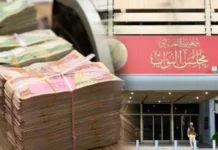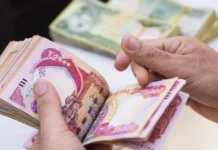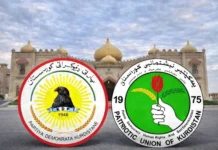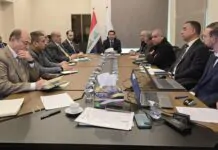Tishwash: Iraq increases its gold reserves to 170 tons
The World Gold Council announced on Saturday that Iraq bolstered its gold reserves by purchasing six tons during the third quarter of this year, bringing its total reserves to 170 tons.
The Council explained in a report ,reviewed by Al-Maalomah News Agency, that “central banks around the world were the main driver of gold demand during the third quarter, following a noticeable slowdown in the first and second quarters,” noting that “net purchases by central banks reached approximately 220 tons during the aforementioned period.”
Despite the significant rise in gold prices—which have jumped by about 50% since the beginning of the year, reaching record levels—demand from central banks continued to increase as part of policies to enhance financial security and diversify reserves.
The report indicated that “Kazakhstan was the largest gold buyer in the third quarter, with its central bank adding 18 tons, raising its total reserves to 324 tons. The Brazilian central bank also purchased 15 tons in September, bringing its total holdings to 145 tons.”
The Central Bank of Turkey continued to bolster its reserves, adding 7 tons to bring its total holdings to 641 tons. The People’s Bank of China and the Czech National Bank each purchased 5 tons, while the Bank of Ghana acquired 4 tons.
Conversely, only two countries saw a decrease in their reserves during the third quarter: Uzbekistan, with a decline of 3 tons, and Qatar, with a decrease of 1 ton. link
Tishwash: US will not accept ‘outside interference’ in Iraq’s new government, special envoy says
Washington is ‘carefully watching’, Mark Savaya says
The US will not tolerate any external actors interfering in the formation of Iraq’s new government, Washington’s special envoy to the country said on Friday.
Mark Savaya, who President Donald Trump last month named as the special envoy to Iraq, said Baghdad had made “significant progress” over the past three years.
“We hope to see this progress continue in the coming months,” Mr Savaya wrote on X.
He said the US is “carefully watching” the process of Iraq forming its new government following elections this month.
Mark Savaya @Mark_Savaya
I look forward to visiting Iraq soon and meeting with the key leaders. Iraq has made significant progress over the past three years, and we hope to see this progress continue in the coming months. At the same time, we are carefully watching the process of forming the new Show more
“Let it be clear that the United States will not accept or permit any outside interference in shaping the new Iraqi government,” he said.
The special envoy said he would be heading to Iraq soon to meet key leaders.
Prime Minister Mohammed Shia Al Sudani’s political bloc won the most seats but a new government could be a way off due to wrangling to build a majority.
Post-election talks between Shiite, Sunni and Kurdish parties in Iraq usually last for months. By convention in Iraq, a Shiite Muslim holds the post of prime minister, a Sunni is parliament speaker and the largely ceremonial presidency goes to a Kurd.
The main challenge for the next government will be addressing long-standing grievances over poor public services, corruption and unemployment – issues that have fuelled mass protests in recent years. The new administration will also need to maintain the delicate balance in ties between Iran and the US, the country’s two main allies. link
************
Tishwash: Iraq enters the era of “digital maturity”… Huge leaps in the use of the internet and social media
Iraq is witnessing a significant acceleration in the use of digital technology in its various forms and methods, coinciding with the entry of thousands of international companies into the Iraqi market. This surge in digital consumption is attributed to what could be considered excessive usage.
According to official figures released by global digital companies, most notably We Are Social, this trend is occurring amidst warnings about the continued escalation of reliance on rapidly advancing technologies and their increasing dominance over the lives of Iraqi citizens, despite the positive aspects of the current digital maturity.
The latest digital data released for October 2025 revealed radical shifts in the Iraqi technological landscape, with the country recording record jumps in internet and smartphone usage rates, a clear indication that Iraq is entering a phase of accelerated “digital maturity”.
A report issued by We Are Social, which highlights the adoption of connected services, showed that Iraq is witnessing an unprecedented phenomenon in the use of social media, which grew by a tremendous 17% in just one year, with the number of digital identities exceeding 40 million.
In detailing the figures, the report explained that the number of mobile phone subscriptions in Iraq has exceeded the actual population, reaching 50.8 million subscriptions, in a country with a population of 47.3 million people, and with a penetration rate of 108% of the total population, the concept is established that the Iraqi citizen depends entirely on the mobile phone as a main gateway to the world, with the phenomenon of an individual owning more than one SIM card being widespread.
These figures come in conjunction with the rise in the country’s urbanization rate to 72.2%, which has facilitated the deployment of communications infrastructure in cities and densely populated areas.
The internet is no longer a luxury in Iraq, but a necessity for daily life. The report indicated that 39.6 million Iraqis use the internet, which is equivalent to 83.8% of the population. This widespread use, which grew by 4.7% compared to last year, practically means the disappearance of the “digital divide” that the country suffered from in previous decades, paving the way for distance education services and digital work.
The most controversial and interesting figure in the 2025 report is the “rocketing” increase in the number of social media users, with 5.8 million new users joining these platforms in the last 12 months alone.
Ali Nouri, a researcher and specialist in digital media, believes that “the number of social media accounts exceeding (40.1 million) the number of actual internet users reflects a deep division of Iraqi society in the virtual space, and the multiplicity of accounts for one individual across different platforms, which makes these platforms the new ‘public arena’ for Iraqis.”
Nouri affirms: “This new digital landscape opens the door for the business sector; the data clearly indicates that the Iraqi market is fully ready for a revolution in e-commerce and financial technology (FinTech), and with a user base of this size, companies that do not have a clear digital strategy will find themselves out of the competition.”
He continues, “These figures place the Iraqi government before urgent obligations, most notably the need to move from the traditional e-government to a ‘smart government’ that provides its services through mobile phone applications to suit the behavior of citizens, in addition to the urgent need for strict legislation related to cybersecurity to protect the data of millions of new users.” link





